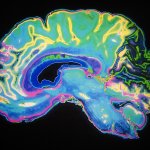Brain Scans Reveal Covid Damage

New research using medical imaging technology has indicated that Covid infections can have significant impacts on the brain, including shrinkage of important areas of tissue.
The study, carried out by the Wellcome Centre for Integrative Neuroimaging at the University of Oxford and published in the journal Nature, involved rescanning nearly 800 UK Biobank patients who had previously had scans, of whom half had suffered mild Covid infections, while the other half had not been infected at all.
A number of significant differences emerged in the group who had suffered from the virus, including brain shrinkage of between 0.2 and two per cent. There was a corresponding loss of grey matter, with this being most linked to the area associated with smell. This could help explain why the loss of this sense is a common symptom of Covid.
The study found sufferers who had experienced brain shrinkage often found it harder to perform tricky mental tasks when they had only recently recovered from the virus. It was not clear whether the virus itself caused shrinkage or this was a consequence of the loss of cells associated with smell due to this sense being lost.
Lead author Prof Gwenaelle Douaud said that, in view of the fact the infections had been mild: “To see that we could really see some differences in their brain and how much their brain had changed compared with those who had not been infected was quite a surprise.”
A key question that has arisen regarding those who have had past infections is whether lingering symptoms will persist for a lifetime, a very long time or gradually fade. Known as ‘Long Covid’, these can include severe problems like a loss of mobility and energy, racing heartbeat and impaired mental function.
To the extent that damage to the brain from the virus might be responsible for at least some of these issues, there is good reason for optimism, Professor Douaud stated.
“We need to bear in mind that the brain is really plastic – by that we mean it can heal itself,” she noted, which means the impact of the infection could ease over time.
Further research may open up more clues about possible links between damage to the brain caused by Covid and a range of other ailments that come under the category of ‘Long Covid’, although some of these may be more directly related to issues like the inflammation of blood vessels and organs, which can persist in some cases.
A further question may be whether brain damage caused by Covid might lead to patients being more likely to suffer neurodegenerative disorders in later life.
It is not the first time a pandemic virus that primarily kills through the impact on the respiratory system has been associated with significant brain damage.
The Spanish Flu pandemic of 1918-19 – which is believed to have killed between 50 and 100 million people – also left over a million with brain damage, leading to a rise in reported neurological disorders in the 1920s.
If you need medical imaging systems in the UK, contact us today.